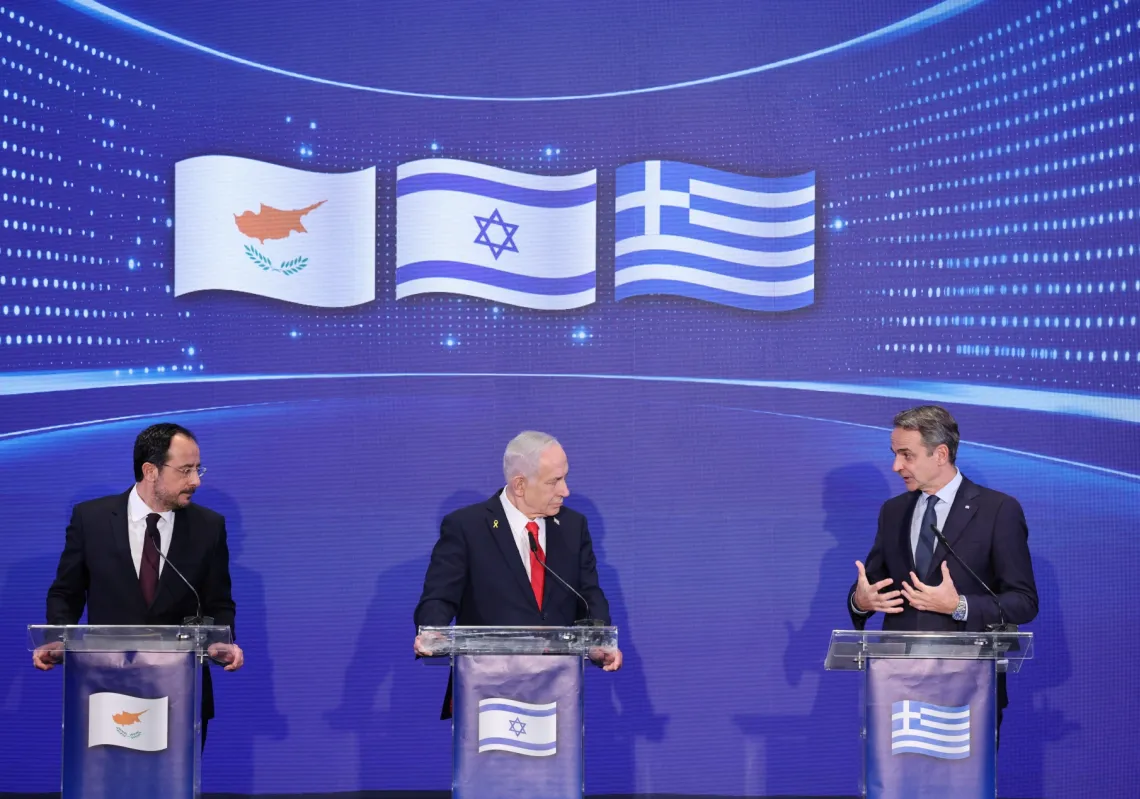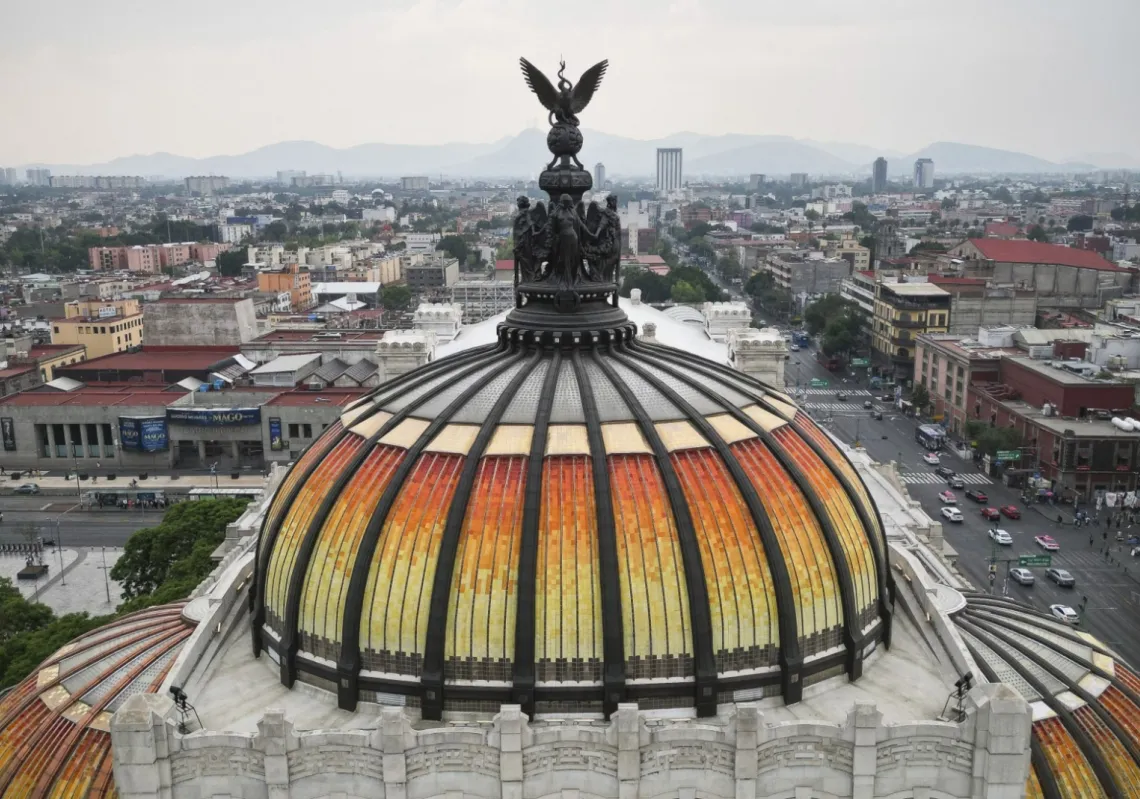 Mohammed Ghanem. TAM HUSSEIN[/caption]Dr Mohammed Ghanem, the UK representative for the Muslim Brotherhood, is in Regents Park Mosque in the process of organizing a demonstration at the Egyptian embassy; but before the chants, the slogans and the crowds, he sits quietly drinking a cup of coffee, chomping on a muffin and reflecting on the events of last week: The first Islamist president in Egypt ousted by a military coup. He had been on a media offensive all week and when The Majalla caught up with him he was not mincing his words.
Mohammed Ghanem. TAM HUSSEIN[/caption]Dr Mohammed Ghanem, the UK representative for the Muslim Brotherhood, is in Regents Park Mosque in the process of organizing a demonstration at the Egyptian embassy; but before the chants, the slogans and the crowds, he sits quietly drinking a cup of coffee, chomping on a muffin and reflecting on the events of last week: The first Islamist president in Egypt ousted by a military coup. He had been on a media offensive all week and when The Majalla caught up with him he was not mincing his words.
Ghanem is from a middle-class family in the Nile Delta. His father was an Al-Azhar graduate and a teacher. Despite this, the young Ghanem did not have any pressing religious inclinations. In fact, Ghanem was a product of Gamal Abdel Nasser’s nascent military apparatus: he was an air-force cadet, a navigator, an officer as well as serving as an accountant under the leadership of Hosni Mubarak.
The seeds of his awakening began while he was working as an accountant for the air force. It was there that he understood the financial potential of the army: it was a great money spinner. While repulsed by the corruption, he did not become part of the Muslim Brotherhood until he moved to London. There, with an accountancy degree, with financial independence and due to the fact that London was the locus for Islamist currents all over the world, he was led into the arms of the Brotherhood.
Ghanem threw himself into Muslim Brotherhood activities with vigor. He worked in close conjunction with UK lawyers pressurizing the Mubarak regime to release those imprisoned and tortured in the 1980s. While shaping the Islamist milieu in the UK and hobnobbing with some of the leading Islamists of his generation, he eventually became an influential figure within the organization.
Majalla: What has caused this coup?
The cleaning of the Deep State. We removed twelve hundred people from the main administration, two-thousand lawyers over the age of sixty, and replaced it with 12,000 young law graduates.
Q: What is the role of the army in all of this?
In Egypt you don’t really run an army, you run estates. The higher your military rank the more privileged you are. The council of the army are some of the richest people in Egypt. They control at least twenty percent of the economy. [Abdel Fattah Sise takes about a million pounds a month]. The whole reason this coup happened was because the Second house began to discuss the military budget and the army reluctantly showed their expenses. The second house wanted to clean it up and a coup followed.
Q: What is the Brotherhood thinking now?
The West wouldn’t understand this; in my mind at the top of this is the Will of God below, that are the Natural Laws. You don’t control what happens but God controls it. We work and exhaust all the avenues that we have in the right direction. But we leave the result to God.
Q: So you don’t see this military coup as a defeat?
We will never accept defeat because once you accept that, then you have been truly defeated. This is part of the Gods plan. There is a verse in the Quran that says: “Do you think that you will say we believe and you won’t be tested?” you have to accept His way and His test in order to see if you can perform good works. It is becoming clear what is happening in Egypt: they are trying to change the constitution so political parties with religious affiliation are not included.
Q: Do you consider this as going back to the dark days of the 1970s?
They will try because that is the aim of the struggle. If Egypt is allowed to be Muslim then it will be one of the top ten countries in the world within five years. Egyptian human resources are vast and if this is guided right by the Quran and Sunnah it becomes a very powerful force.
Q: What are the outcomes of the Brotherhood’s protest?
They have done exactly what they did in Nasser’s time. It’s very simple if we accept the coup then it’s a defeat and we will never be defeated. We would rather die than be defeated; this then is the equation. Nasser has done to Ikhwan and the Egyptian people something which you can’t imagine. What happened? Nasser died Ikhwan remains. Then Sadat came and oppressed us. What happened? Sadat is dead Ikhwan remains. Mubarak has oppressed us in the most violent manner. What happened? Mubarak is gone Ikhwan is here. The Mubarak System is trying to come back but it will never come back.
Q: Currently what is the danger that you foresee? Will you go down the route of the Turkish AK party who were banned and then came back stronger?
All of these events are in the hands of God. The example of the AK party is the politics of the defeated. I will give you an example, how long did we negotiate over Palestine? How much did we get? Once you start to negotiate on your right you have lost it all. What has happened in Egypt is a violation of the people how can you accept that? You have to restore what is right and before we negotiate.
Q: Do you think that the Brotherhood were too quick to cleanse the Deep State cultivated over decades?
It’s a theory and I accept it. But as I said in terms of decisions we take them as a group (shura), having a candidate like Morsi was split 48 to 52. I always say and this is my understanding, if you consult and even if your decision is wrong God will bless it. And this is the only way we do it. We as a group depend on the will of the people this is the real power, not America and not even numbers. We call on people and the people turn up because they want to.
Q: How does the Brotherhood feel that Al-Azhar and the Salafist Noor party supported the military take over?
We will make excuses for them, we all have different understandings. And we pray that God guides them. We hope they don’t work against us. We won’t condemn them and we won’t go against them. It is not our job to fight anyone. It is our job to claim our right.
Q: There has been a military coup but critics are saying that the Brotherhood is responsible for this because they forced an Islamist agenda on the people. Any thoughts?
If you want to be fair let’s put a fair criterion of measurement. Who controls the media today? the military. Who is arresting people? the military. Who is abolishing the constitution? the military.
Q: Critics argue that not everyone took part in the constitution.
This is a lie, sixty-four percent of the Egyptian people agreed on it not the Brotherhood. And again why a coup? If you want to change it take it to parliament where it can get changed. It’s up to the Egyptian people. Actually this is the first time in Egyptian history that the constitution took away power from the Egyptian president. Mursi himself limited his own power. Does that justify a military coup?! It’s just a deception.
Q: What lessons can the Brotherhood take considering that they are at a major crossroads?
The lesson is: look at what people do when they hijack the revolution. They have planned for this for a long time.
Q: Could you have done things better?
You cannot guarantee anything except that you consult each other.
Q: Do you think this will radicalise the young and turn them away from democracy?
No. Shura is part of Democracy, we have representative legislation and divine legislation. We have to have election and be transparent. The sharia in its applicability can differ but shura [consultation] and elections is sanctioned in the Quran. Where people might differ is how divine law is applied.
Q: What should be the response of western governments?
We understand that the West has their own interests and they have to serve their own interests. But we don’t place much importance to them; our source of power is God and the Egyptian people.
Q: So do you think their response was appropriate?
It will never be appropriate because their interest is counter and in conflict with the interest of the Egyptian people.
Q: There is a thesis that says that the revolution was only skin deep and that the Muslim Brotherhood were never really in power. Do you agree with that?
No we were in power. Why do you think they were trying to kick us out? They offered Mursi to stay as a figurehead but not to be in power. He didn’t accept it.









